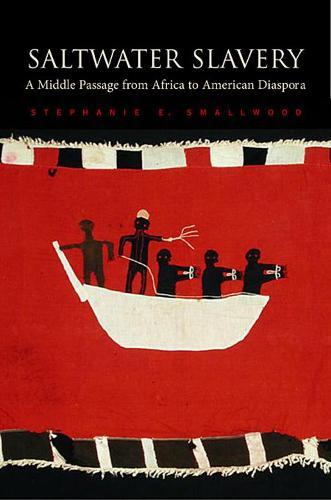Full Product Details
Author: Stephanie E. Smallwood
Publisher: Harvard University Press
Imprint: Harvard University Press
Dimensions:
Width: 14.00cm
, Height: 1.90cm
, Length: 21.00cm
Weight: 0.272kg
ISBN: 9780674030688
ISBN 10: 0674030680
Pages: 288
Publication Date: 01 September 2008
Audience:
College/higher education
,
Professional and scholarly
,
Undergraduate
,
Postgraduate, Research & Scholarly
Format: Paperback
Publisher's Status: Active
Availability: Available To Order

We have confirmation that this item is in stock with the supplier. It will be ordered in for you and dispatched immediately.
Reviews
This deeply researched, tightly focused, and skillfully evocative look at the Atlantic slave trade, 1675-1725, details the experience of crossing the ocean - an ordeal fatal to many of the slaves who were forced to undertake it. - The Atlantic In this stark depiction of slaves and their 'utter alienation from the most basic norms of everyday life,' Smallwood simultaneously delivers a lucid popular history and expands scholarly understanding of slavery with a thorough, clear-eyed look at the dreaded Middle Passage and how it shaped the slave experience... Smallwood is particularly adept at portraying, in detail, the unbearable conditions of the slave ships... She has a storyteller's knack for well-pitched anecdotes and pointed examples. - Publishers Weekly Saltwater Slavery is the new starting point for studies of the Middle Passage and required reading for students of the black Atlantic. - Ira Berlin, author of Many Thousands Gone
Smallwood aims to move away from the numbers game that has ensnared so many other historians studying the Middle Passage. Instead of ledgers and account books, she uses letters, journals, and narratives from around the trade route to get closer to the slave experience itself. As the narrative follows the progress of the newly enslaved across the Middle Passage, Smallwood's use of quotes brings to life the everyday horror experienced by Saltwater Slaves, as Africans first arriving in the Americas were described at the time. -- Kathryn V. Stewart Library Journal 20070115 In this stark depiction of slaves and their 'utter alienation from the most basic norms of everyday life,' Smallwood simultaneously delivers a lucid popular history and expands scholarly understanding of slavery with a thorough, clear-eyed look at the dreaded Middle Passage and how it shaped the slave experience...Smallwood is particularly adept at portraying, in detail, the unbearable conditions of the slave ships...Extensive research, much of it from primary sources, forms Smallwood's basis, but she has a storyteller's knack for well-pitched anecdotes and pointed examples. Publishers Weekly 20070219 This deeply researched, tightly focused, and skillfully evocative look at the Atlantic slave trade, 1675-1725, details the experience of crossing the ocean--an ordeal fatal to many of the slaves who were forced to undertake it. The Atlantic 20070401 Stephanie E. Smallwood's excellent book Saltwater Slavery has attracted less attention than it deserves. Making careful use of the primary sources at [the National Archives at] Kew, Smallwood follows 300,000 captives taken from what is now Ghana between 1675 and 1725, to widening circles of the diaspora in the Americas. ...An ambitious, innovative and highly successful feature of her book is to take what is known about the beliefs of the isolated societies from which slaves were taken--communities who in some cases had never seen white people, the ocean or a ship--to offer a carefully controlled imaginative reconstruction of how the embarked slaves may have conceptualized the saltwater experience and attempted to reconcile what they saw with their existing world view. -- William St. Clair Times Literary Supplement 20080314
Author Information
Stephanie E. Smallwood is Associate Professor of History at the University of Washington, Seattle.




